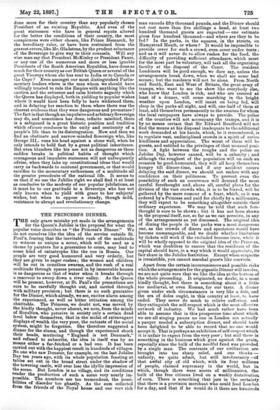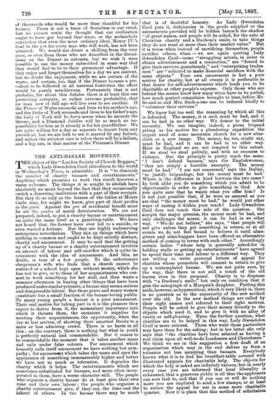THE PRINCESS'S DINNER. T HE only grave mistake yet made in
the arrangements for the Queen's Jubilee is the proposal for what the popular voice describes as " the Princess's Dinner." We do not ourselves like the idea of the service outside St. Paul's, fearing that the inevitable rush of the multitude to witness so unique a scene, which will be used as a theme by painters for a generation to come, may lead to some kind of catastrophe like the one in Russia. Our people are very good humoured and very orderly, but they are given to eager rushes ; the women and children will be out in countless swarms, and the rush of a real multitude through spaces penned in by immovable houses is as dangerous as that of water when it breaks through a reservoir to sweep down a river valley. As the Queen will be present, however, at St. Paul's the precautions are sure to be carefully thought out, and carried through with military precision ; but there is no such guarantee for the Dinner, which already, we see, excites alarm among the experienced, as well as bitter irritation among the charitable. The Princess, we doubt not, was moved by the kindly thought, never absent, we note, from the minds of Royalties, who perceive in society only a certain dead level below themselves, that in the midst of extravagant displays of wealth the very poor, the outcasts of the social system, might be forgotten. She therefore suggested a dinner for the slums, and though the experienced shook their heads, muttering " England is not Denmark," and refused to subscribe, the idea in itself was by no means either a far-fetched or a bad one. It has been carried out with the happiest result in hundreds of villages. No one who saw Dunster, for example, on the last Jubilee Day ten years ago, with its whole population feasting at tables set out in the broad street under the shadow of the towering castle, will ever lose the idyllic impression of the scene. But London is no village, and its conditions render the production of such a scene very nearly im- possible. The numbers are too tremendous, the possi- bilities of disorder too ghastly. As the sum collected from the friends of the Royal house and one very rich man exceeds fifty thousand pounds, and the Dinner should not cost more than five shillings a. head, at least two hundred thousand guests are expected — one estimate gives four hundred thousand—and where are they to be fed ? In the parks, in the squares, in the streets, on Hampstead Heath, or where ? It would be impossible to provide cover for such a crowd, even cover under tents ; and as it will never do to allow rushes for the food, the difficulty of providing sufficient attendance, which must for the most part be voluntary, will task all the organising faculty at the disposal of the Court. The resident Londoners will be good enough, we dare say, unless the arrangements break down, when we shall see some bad scenes ; but the residents will not be alone. From North and South, East and West of Britain, the great army of tramps, who want to see the show like everybody else, who know that London is rich, and who are assured at least of a dinner, will come marching in the bright weather upon London, will insist on being fed, will sleep in the parks all night, and will, one-half of them at least, add themselves permanently to the swarms for whom the local ratepayers have always to provide. The police of the counties will not accompany the tramps, and it is by no means certain that Sir Edward Bradford will not find the means at his disposal inadequate to the additional work demanded at his hands, which, be it remembered, is to regulate vast, undisciplined crowds in a spirit of entire kindliness and appreciation. The worst of them will be guests, and entitled to the privileges of that unusual posi- tion. A fight between the roughs and the police on Jubilee Day, however caused, will be a calamity ; and although the roughest of the population will on such an occasion be good-humoured, they will all keep themselves hungry till dinner-time, and if any accident occurs delaying the said dinner, we should not reckon with any confidence on their politeness. To prevent even the possibility of such an occurrence will demand the most careful forethought and, above all, careful plans for the division of the vast crowds who, it is to be feared, will be gathered by the mere rumour of a feast, which, as it was ordered by a Princess and paid for chiefly by a millionaire, they will expect to be something altogether outside their ordinary experience. We may be told that such fore- thought is sure to be shown ; but it has not been shown in the proposal itself, nor, so far as we can perceive, in any of the arrangements as yet discussed. The original idea of dining the people in the parks was a most dangerous one, as the crowds of diners and spectators would have become unmanageable, and we doubt whether limitation by tickets will work if the excluded become irate, while it will be wholly opposed to the original idea of the Princess, which was doubtless to ensure that the residuum of the capital should have, in a way which it would appreciate, its fair share in the Jubilee festivities. Except when etiquette is irresistible, you cannot marshal guests like convicts.
Apart from the certain inconveniences and possible risks which the arrangements for the gigantic Dinner will involve, we are not quite sure that we like the idea at the bottom of the whole proceeding. It originated, no doubt, in a most kindly thought, but there is something about it a little too medimval, or even Roman, for our taste. A dinner given under such circumstances is very like a dole, and the era of doles ought, in this country at least, to have ended. They never do much to relieve suffering. and they extinguish the self-respect which is the most effective outwork of industry. We had much rather have been able to assume that in this prosperous time about which we are all singing pmans no one in London not actually a pauper needed a subscription dinner, and should have been delighted to be able to record that no one would accept it. That is perhaps an exhibition of self-respect which it is unfair to expect from the very poor ; but still there is something in the business which goes against the grain„ especially since the bulk of the needful fund was provided by a single man. The contrasts of our civilisation are brought into too sharp relief, and one thinks — unfairly, we quite admit, but still involuntarily —of that awful city of old which, with its four millions of people, claimed supremacy in the world, but in which, though there were scores of millionaires, the bulk of the free citizens lived on a weekly distribution of corn. There is something that jars in the certainty that there is a provision merchant who could feed London for a day, and that if he would do it there are hundreds of thousands who would be more than thankful for his bounty. There is not a trace of Socialism in our creed, but we cannot resist the thought that our civilisation ought to have got beyond that stage, or the melancholy conviction that even the most ordinary ideal, Henry IV.'s fowl in the pot for every man who will work, has not been attained. We would not divert a shilling from the very poor, or even from those who are described in the discus- sions on the Dinner as outcasts, but we wish it were possible to use the money subscribed in some way that they would feel to be to their permanent advantage. If they enjoy and forget themselves for a day we are content, but we doubt the enjoyment, while we are certain of the waste, and certain, too, that if the Dinner became a pre- cedent to be followed in all national festivities the effect would be purely mischievous. Fortunately that is not probable, for about this Jubilee there is at least this one protecting certainty, or rather extreme probability, that no man now of full age will live ever to see another. If the Prince of Wales succeeds and lives to his mother's age, and the Duke of York succeeds and lives to his father's age, the baby of York will be forty-seven when he ascends the throne, and a Diamond Jubilee will be as much an im- possibility for him as it already is for his grandfather. We are quite willing for a day so separate to depart from any precedent, but we are loth to see it marred by any failure, and unless the strictest care is taken there will be a failure, and a big one, in that matter of the Princess's Dinner.







































 Previous page
Previous page